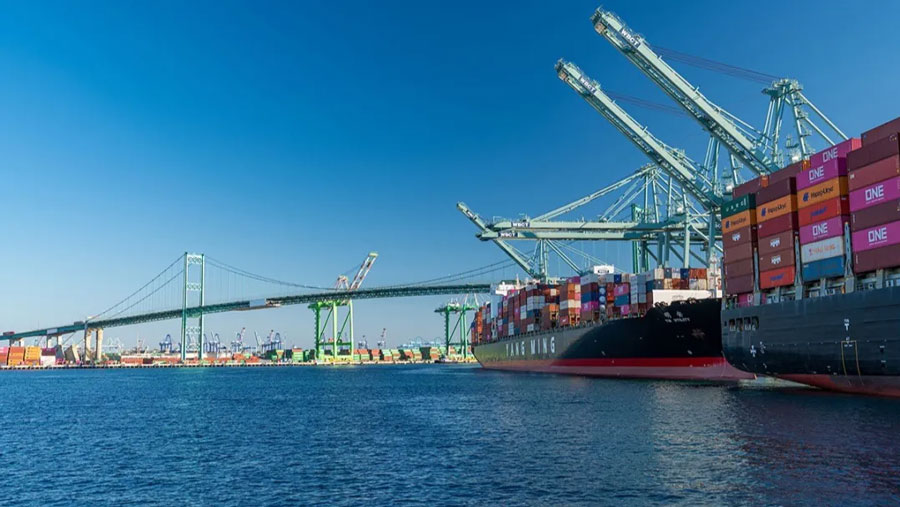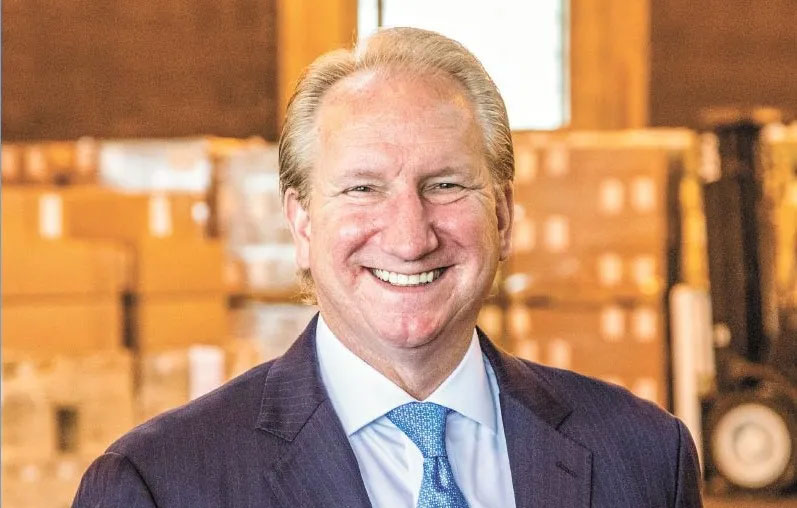

Port of Los Angeles saw a surge in throughput in October in response to upcoming tariffs.
U.S. imports from China have surged this year during the shipping season.
On November 20, the Port of Los Angeles reported an unprecedented 905,026 TEU throughput for October, up 25% from the same period last year and the first time the port has handled more than 900,000TEU for four consecutive months.
In early November, as the US election came to an end, President-elect Trump and his tariff policy once again became a hot topic in the market. Although "tariffs" are often associated with disruption to the market and disruption to trade, it is widely expected that the fear of tariffs may cause a short-term Chinese export "boom" before Trump officially takes office.
A slew of recent economic data seems to confirm this fact.
Despite ongoing trade tensions and new tariffs, U.S. companies have shown resilience in maintaining their supply chains, with imports from China up nearly 6% compared to the same period in 2023, according to supply chain technology provider project44.
China's imports and exports of goods totaled 3,7007 billion yuan in October, up 4.6 percent year on year and 3.9 percentage points faster than the previous month, according to data released by the National Bureau of Statistics. Of this total, the export was 2.189.9 billion yuan, up by 11.2%; Imports were 1,510.8 billion yuan, down 3.7 percent.
Trump tariffs scare markets?
"There could be real front-loading before tariffs are implemented." "As companies try to get ahead of this, as we go into the first quarter, you may actually see a small uptick in global manufacturing, in Chinese manufacturing," Joe Lupton, senior global economist at jpmorgan Chase, said in a podcast.
But in fact, this growth trend seems to have been reflected in the economic data for October.
The unexpected surge came after the Biden administration implemented tariffs in September, including 100 percent tariffs on Chinese electric vehicles, 50 percent tariffs on solar cells, and 25 percent tariffs on steel, aluminum, electric vehicle batteries, and key minerals.
It turns out that the tariff policy has prompted many traders to bring forward shipments as a cost-cutting strategy.
Despite global efforts to diversify supply chains in the wake of the coronavirus outbreak, China still accounts for about 40.7 per cent of total US imports, according to Project44. This dominance is further evidenced by increased trade activity at China's major ports, with Yantian, Shanghai and Ningbo seeing the most significant export volume growth.
Interestingly, during the same period, Vietnam, which boasted of its rising power, saw its mouth volume to the United States decline by nearly 4%. Analysts say that this is also affected by the strong export of China.
Of course, the October surge at the Port of Los Angeles/Long Beach was partly due to domestic influences. The West Coast's major ports of New York, Savannah, Houston and Charleston saw only slight declines in cargo volumes in the June to October period. The Port of Los Angeles/Long Beach on the East Coast already imports nearly 40 percent of all cargo in the United States, a result of long-term changes in the freight structure.
The market is generally optimistic
On January 20 next year, Trump will be officially inaugurated as the new president of the United States. Tariffs are expected to come soon after he takes office.
Still, that doesn't mean that tariffs will also come in January. Analysts said that depending on the timing of the US 301 investigation and the imposition of tariffs, it will take at least three to five months before the tariffs take effect.
The market is generally optimistic about the market outlook from the end of this year to the beginning of 2025.
On November 20, the Port of Los Angeles reported an unprecedented 905,026 TEU throughput for October, up 25% from the same period last year and the first time the port has handled more than 900,000TEU for four consecutive months.

In early November, as the US election came to an end, President-elect Trump and his tariff policy once again became a hot topic in the market. Although "tariffs" are often associated with disruption to the market and disruption to trade, it is widely expected that the fear of tariffs may cause a short-term Chinese export "boom" before Trump officially takes office.
A slew of recent economic data seems to confirm this fact.
Despite ongoing trade tensions and new tariffs, U.S. companies have shown resilience in maintaining their supply chains, with imports from China up nearly 6% compared to the same period in 2023, according to supply chain technology provider project44.
China's imports and exports of goods totaled 3,7007 billion yuan in October, up 4.6 percent year on year and 3.9 percentage points faster than the previous month, according to data released by the National Bureau of Statistics. Of this total, the export was 2.189.9 billion yuan, up by 11.2%; Imports were 1,510.8 billion yuan, down 3.7 percent.
Trump tariffs scare markets?
"There could be real front-loading before tariffs are implemented." "As companies try to get ahead of this, as we go into the first quarter, you may actually see a small uptick in global manufacturing, in Chinese manufacturing," Joe Lupton, senior global economist at jpmorgan Chase, said in a podcast.
But in fact, this growth trend seems to have been reflected in the economic data for October.
The unexpected surge came after the Biden administration implemented tariffs in September, including 100 percent tariffs on Chinese electric vehicles, 50 percent tariffs on solar cells, and 25 percent tariffs on steel, aluminum, electric vehicle batteries, and key minerals.
It turns out that the tariff policy has prompted many traders to bring forward shipments as a cost-cutting strategy.
Despite global efforts to diversify supply chains in the wake of the coronavirus outbreak, China still accounts for about 40.7 per cent of total US imports, according to Project44. This dominance is further evidenced by increased trade activity at China's major ports, with Yantian, Shanghai and Ningbo seeing the most significant export volume growth.
Interestingly, during the same period, Vietnam, which boasted of its rising power, saw its mouth volume to the United States decline by nearly 4%. Analysts say that this is also affected by the strong export of China.
Of course, the October surge at the Port of Los Angeles/Long Beach was partly due to domestic influences. The West Coast's major ports of New York, Savannah, Houston and Charleston saw only slight declines in cargo volumes in the June to October period. The Port of Los Angeles/Long Beach on the East Coast already imports nearly 40 percent of all cargo in the United States, a result of long-term changes in the freight structure.
The market is generally optimistic
On January 20 next year, Trump will be officially inaugurated as the new president of the United States. Tariffs are expected to come soon after he takes office.
Still, that doesn't mean that tariffs will also come in January. Analysts said that depending on the timing of the US 301 investigation and the imposition of tariffs, it will take at least three to five months before the tariffs take effect.
The market is generally optimistic about the market outlook from the end of this year to the beginning of 2025.






